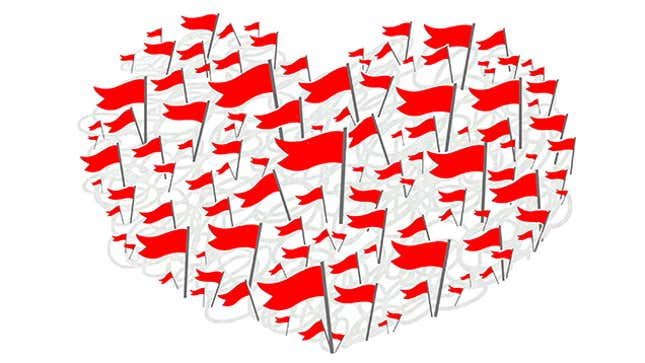Dealbreakers Don't Mean Shit
Latest

Everybody has dealbreakers, right? You won’t date a vegetarian who doesn’t drink, a Republican who likes active rock, anyone seriously into SUP yoga. But then you find yourself falling for someone in spite of these egregious errors of existence, wondering where your cherished list went. Guess what? Apparently everyone does this.
Over at Science of Us, Samantha Joel tells us that everyone is bad at maintaining their dealbreakers, and looks at why such highly prized ideals about who we think we should be with never seem to matter all that much when we meet someone new. Seriously, why did you even get with him?
Joel writes:
Some time ago, I wrote a post about how single people can readily call to mind all of the traits and features that they are looking for in a mate, yet these preferences seem to go right out the window when people make real-life dating decisions. Research consistently shows that what people say they want in a partner has virtually no bearing on who they actually choose to date in a laboratory setting. And yet, once people are in established relationships, they are happier with those relationships when their partners match their ideals. In other words, we all know what we want in a romantic partner, but we often fail to choose dating partners based on those preferences.
If we had to guess why this was true, we’d probably say things like:
My attraction was more powerful than his lack of interest in challenging films.
We had so much fun together, so I forget that she voted for McCain.
And that is true to an extent: The post Joel links above says the big thing that gets in the way of your ability to evaluate the person in front of you against the checklist in your head is…wait for it… your stupid involuntary feelings: Chemistry, attraction, rapport can all quickly annihilate the scorecard you meticulously devised about what you want and have always wanted and have honed over the course of your entire dating life and maybe even actually put on a real list somewhere in a hope chest in your heart, that is how much it meant to you.
Because of that, you ignore the fact that he’s actually bad at telling a good story, or sometimes, I dunno, entirely rewrite their personality to omit the glaring red flag sitting across from you smoking cigs and avoiding adult responsibility.
This is all going to catch up to you later, though, when you realize you are incompatible and break up and suddenly in retrospect see every trait and its inevitable destructive impact on the relationship like some kind of view from command ops. But what is to be done? Eliminate everyone who doesn’t meet the criteria regardless of spark?
-

-

-

-

-

-

-

-

-

-

-

-

-

-

-

-

-

-

-

-

-

-

-

-

-

-

-

-

-

-

-

-

-

-

-

-

-

-

-

-








































